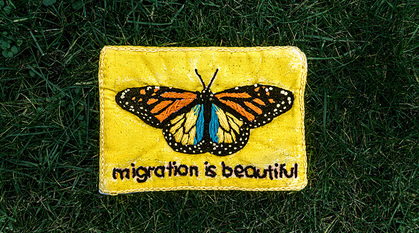Migrant rights are human rights
Cassidy McKenna explains how Quakers can use a new UN agreement to push for a more welcoming and humane environment for migrants to Britain.

While it has gained increased political and press attention in recent years, the movement across national borders of people who do not qualify for refugee status is not a new phenomenon. Neither is the call to advocate for those people, and to ask that every person who migrates, regardless of their circumstances, is treated with humanity, dignity and kindness.
However we now have an exciting new opportunity to move the human rights of those who migrate up the agenda of our governments. This year on Human Rights Day (10 December) Member States of the UN will adopt an unprecedented agreement in this area: the Global Compact for Safe, Orderly and Regular Migration.
This intergovernmentally negotiated agreement will be a formal part of the UN framework. Broad in scope, it covers all aspects of global migration: everything from protecting the right to life during sea crossings to the ethical recruitment of workers. Embedded within it is the recognition that all nations are places of origin, transit and destination, and that an 'us and them' attitude contributes towards a climate of dehumanisation of migrants.
A progressive approach
Since 2016 the Quaker United Nations Office Geneva (QUNO) has closely followed and supported the discussions around the Compact. We have called for an ambitious, effective and human rights based agreement as part of our wider work to achieve changes in international standards and practice that support the Quaker vision of a world in which peace and justice prevail.
With increasing persecution of those who have needed to leave their homes, as well as those who seek to protect them when they do, we are relieved that such an agreement has been achieved. This is a global policy that is often more progressive, more optimistic, and more humane than the national government positions of those who negotiated it.
Crucially the Compact provides a new way to lobby our governments for a more progressive approach to our national migration policy, by using a document that they themselves wrote as our tool. Rather than asking only for what we want as citizens, we can now remind our representatives that they themselves have agreed to implement these policies for migrants, and that we will keep reminding them until they do.
What you can do
At QUNO we would like to encourage Quakers and others in Britain to write to their elected representatives with messages that:
- welcome the adoption of the Global Compact,
- highlight key recommendations from the text,
- ask what work is now being done to meet these new requirements.
For example, Objective 15, which looks at the need for access to basic services for migrants, states that service providers and immigration authorities should not "exacerbate vulnerabilities of irregular migrants by compromising their safe access to basic services or unlawfully infringing upon the human rights to privacy, liberty and security of person at places of basic service delivery".
This is a very different vision to the UK's professed 'hostile environment' for migrants, where a fear of detection, detention and deportation acts as a barrier to migrants accessing essential services. MPs can be asked what is being done to reverse this policy.
Objective 13 states that immigration detention should only be used a measure of "last resort". It says that "the negative and potentially lasting effects of detention on migrants" should be reduced by "guaranteeing due process and proportionality" and making sure that it is "for the shortest period of time".
The UK is the only country in Europe with indefinite immigration detention. MPs can be asked how they are working to change this and to introduce a 28-day time limit in alignment with the Global Compact's explicit statement on this issue.
Pushing for change
These are just two points from the Compact that can be used to push for change in UK policy on migration. If you are keen to find out more, we will be holding a workshop on advocacy and the Global Compact in September 2019 as part of the Quaker Asylum and Refugee Network Conference.
At QUNO we are always working to increase our communication with Quakers and other interested actors on the issues that we work on. If you would like to contact us about action around the Global Compact, or migration more generally, please get in touch at cmckenna@quno.ch.
There has never been a better time to remind our decision makers that migrant rights are human rights.
Download QUNO's briefing on using the Global Compact on Migration


